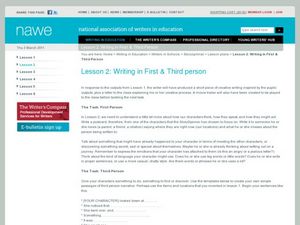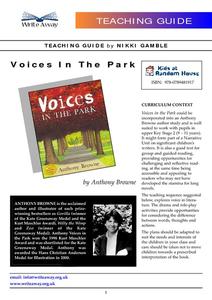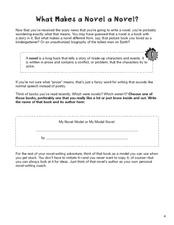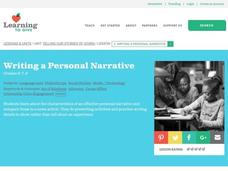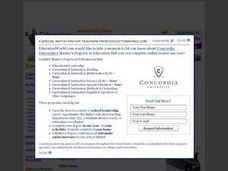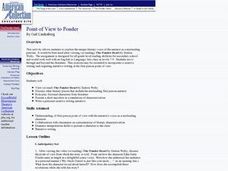K12 Reader
Change the Point of View: First Person and Third Person
How is a story different when told from various points of view? Learn about first and third person points of view with an activity based on Robert Louis Stevenson's Treasure Island. Readers examine a passage written in first person,...
K12 Reader
Change the Point of View: Third Person to First Person
Use Jack London's The Call of the Wild to help young writers learn the difference between first and third person points of view. After they read a passage from the novel, they rewrite it in the first person point of view.
Curated OER
Writing in First and Third Person
Explore narrative writing by participating in a role-playing activity. In this perspective instructional activity, learners define first and third person in writing and discuss how it changes the mood of the reader. The first activity...
K12 Reader
Narrator’s Point of View Flow Chart
How can you tell what point of view a narrator is using, and why does it matter when reading or writing? Use a handy flow chart to determine whether or not your narrator is telling the story from a first or third person point of view.
K12 Reader
Point of View: Who Is Telling the Story?
See how famous books of literature have different perspectives with a short activity. After reviewing the difference between first and third person points of view, learners look over six passages from various novels and decide which...
K12 Reader
Narrator and Point of View
Point of view is important when choosing a narrator. Help young writers distinguish between first and third person point of view with an activity that features excerpts from Robert Louis Stevenson's Treasure Island. After reading...
Write Away!
Voices In the Park
Explore the impact a narrator's point of view has on a story with a reading of the children's book, Voices in the Park by Anthony Browne. Written in four different voices, the story is told and retold from different perspectives to...
Curated OER
Writing a Personal Narrative
What is the difference between a news story and a personal narrative? This plan has learners write a personal narrative using the topic of service projects in their community. Consider completing a cross-curricular extension by bringing...
Curated OER
What Makes a Novel a Novel?
As your authors prepare to write a hypothetical novel, they need all the inspiration they can find! Using a book they have already read (and enjoyed), learners complete a literary analysis by filling in eight short-answer...
Curated OER
The Individual and His Role in Society
Tenth graders discover how various writers approach the themes of : alienation and solitude, living life "deliberately" and "phonies." Through reading, journaling, class discussion, and writing assignments they realize the power of the...
Curated OER
Hawthorne: Author and Narrator
Students examine the difference between a narrator and author. They read Nathaniel Hawthorne's novel, 'The Scarlet Letter,' write a description of the narrator, and research how Hawthorne was impacted by the politics of the time.
Kansas Poets
Persona Poem
Young poets are asked to craft a poem in the voice of a first person narrator, a dramatic monologue of sorts, that reveals not only a dramatic situation but something of the narrator's character as well.
Curated OER
Point of View
Fifth graders identify first and third person points of view in literature. In this point of view lesson students compare the point of view in different pieces of literature, some telling the same story. Students write a first-person...
Curated OER
Writing Sentences Lesson Plan
Students explore first person and third person points of view. In this perspective lesson, students identify first person and third person points of view in literature they have read. Students rewrite stories from different perspectives.
Curated OER
Writing a Personal Narrative
Students learn characteristics of an effective personal narrative. In this personal narrative lesson, students discover ways to show rather than tell, adding richness and detail to their writing. Students evaluate a news...
Manchester College
What’s Your Point of View?
Work on deciphering the point of view of various pieces of literature. As readers review the concepts of first, second, and third person perspective, they apply what they know to different passages.
Have Fun Teaching
Who Am I? (14)
What's the difference between a clown and a cashier? Use context clues to infer what each character does for a living in five different reading passages. Kids mark their choices on the space provided.
EngageNY
Analyzing Point of View: Inferring about the Impact of Hurricane Katrina on People Living in New Orlean
What, where, how? Readers hone their analysis skills as they determine the narrator's point of view in Eight Days. They complete a literary analysis chart and essay to describe what and where events take place. Individuals then discuss...
National Endowment for the Humanities
Narrative Voice in Moby Dick
Call him a reliable narrator! Ishmael is the focus of a lesson plan that asks readers to analyze the complex character of Herman Melville's narrator as he is introduced in the first chapter of Moby Dick.
Curated OER
Bambara's The Lesson
Twelfth graders read the short story The Lesson. They research the socio-economic and cultural context of the story and author. They examine the author's point of view. They analyze the first person narration in the story. They rewrite...
Curated OER
Walk in My Shoes: A Shoe's Perspective
Help learners write a creative story from the viewpoint of a shoe. The teacher brings a variety of different types of shoes to the classroom and each person chooses one. They then write a story from the point of view of the shoe,...
Curated OER
Point of View to Ponder
Students view (or read) The Ponder Heart by Eudora Welty. They
discuss other literary pieces that include the misleading first person narrator. They
role play fictional characters from literature and present a short anecdote in a...
Curated OER
1st and 3rd Person
Sixth graders listen as the teacher describes the difference between the 1st and 3rd person. They then search through their literature books to find a story written from a 3rd person perspective and discuss why the story is in third...
MENSA Education & Research Foundation
Magical Musical Tour: Using Lyrics to Teach Literary Elements
Language arts learners don't need a lecture about poetry; they listen to poetry every day on the radio! Apply skills from literary analysis to famous songs and beautiful lyrics with a lesson about literary devices. As...




